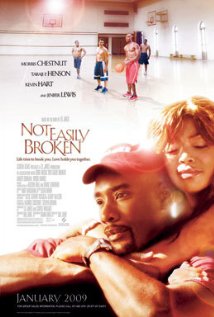
NOT EASILY BROKEN
US, 2009, 99 minutes, Colour.
Morris Chestnut, Taraji P.Henson, Maeve Quinlan, Kevin Hart, Wood Harris, Eddie Cibrian, Jenifer Lewis, Albert Hall.
Directed by Bill Duke.
This film harks back to some films of decades ago when the Billy Graham campaign or the Moral Rearmament organisation made feature films with moral values and explicit moral tone and language and screened them for their constituencies in churches, church halls. In the US, with so many evangelical churches flourishing these days and so many African American congregations, films like Not Easily Broken are being screened in the multiplexes. It is hoped that they do some positive good and offer some hopeful and decent role models, but it seems that they are unlikely to make much of an impact outside of their target audience, even less so in countries with European cultures.
The focus of this film is marriage. The bishop who celebrates the wedding at the beginning reminds husband and wife that there is a third thread in the cord he winds around them: God. (The film is not afraid of using God language, especially at the finale.)
The setting is LA. The wife (Taraji P. Henson, Oscar-nominated for Benjamin Button) becomes a successful real estate agent, worldly and ambitious with a bitter and dominant mother who dislikes her son-in-law (and then some...!). The husband (Morris Chestnut) is less successful as a contractor but, because he has no children, coaches deprived kids in baseball. When a sudden car accident changes their lives, the crisis in their marriage comes to a head.
The film is emotional, sometimes sentimental, touching familiar themes of sport and achievement, injury, death and therapy, grief and overcoming self-centredness.
There is a danger with reviewers and audiences who are not on this African- American, American, God-centred, heart on sleeve culture that they run the danger of easily dismissing such films and unwittingly taking a superior attitude towards these cultures that they himself would personally judge as inferior to these. Audiences don't have to like this kind of film, but the world they picture deserves respect.
1. Motivational film? The writer and the company for faith and life films? For an American audience? African American audiences? World audiences?
2. The title, the Bishop and his reference to the cord around the married couple, not easily broken, and God as the third string? At the marriage ceremony, in the discussions of marriage counselling, at the end and the reuniting of the couple?
3. The American city, sport, training of young boys, parents? Real estate and the selling houses, with commissions? Accidents, hospital? The swimming competition and disaster? Homes? The musical score?
4. The voice-over, David and his experience, of marriage, of love, of his wife’s ambition, his mother in law’s presence and influence, sport and his injuries, his friends and their training the boys, Julie and her son, the alienation from Clarice, the attraction to Julie, the counselling with the Bishop, the end and the resolution?
5. The sequence of the marriage ceremony, the cord not easily broken, the couple going off on the honeymoon? The years passing? David and his injury, his small construction business, his truck? Clarice and her ambitions, her success in selling buildings, her friend at the office and their gossip, her demands on Dave, always calling him David, wanting him to have a better truck, her going out but resenting his drinks with his friends? Going to the awards ceremony, the argument, the crash?
6. Clarice, the influence of her mother, her mother’s resentment towards her husband, ousting him? Her accusations, Clarice saying she had asked her father about them, her mother’s hatred for him? Infecting Clarice, becoming the image of her mother, talking like her mother? Arguing with David, the dinner, her talk, David expected to pay for the dinner, the failure of the credit card, her anger? The accident, her mother blaming David entirely for the accident? In hospital, coming out, her resentment? Her mother moving in, Clarice’s moodiness and condemning David? The interview with Julie, Julie’s patience, her mother intervening, the physical therapy and Clarice’s recovery, walking again, going back to work, the selling of the mansion and giving part of the commission to her friend?
7. David, his friends, Tree and his talk, his marriage? Boyd, the divorce, the attraction towards Julie, her reading him correctly, warning him about no relationship, his bringing the flowers? Their concern when Julie’s son had the accident, going to the hospital? David comforting Julie?
8. The boys, the training, Derius and his father, the clash with David? The later meeting, the basketball, the memories of the past, the scholarship, the father and his failure in life? Their fight? the reconciliation, the boy coming back to play sport, his father’s support?
9. Julie, her son, swimming, the coach, the hopes, his going to the baseball training and enjoying it? The race, the accident, his death?
10. Clarice and her mother, the frank talk, Clarice going to confront Julie, her harsh judgments? Telling her mother the truth, asking her to leave?
11. David, moving out, the motel room, Clarice arriving, the food, the talk, her admitting her failures in the past, the reconciliation?
12. The issue of having a child, Clarice not being ready, David and his wanting a son, the compensation of training the boys? The end and Clarice being pregnant?
13. The role of the Bishop, the wedding, the counselling, his friendship, asking direct questions, being frank with both David and Clarice? The issue of God and the cord?